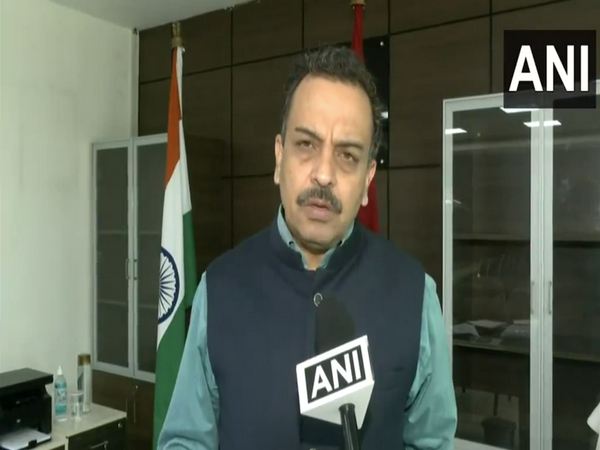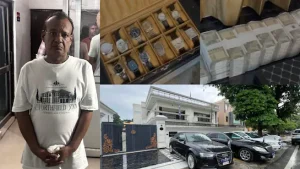Ghaziabad, Uttar Pradesh – A major diplomatic fraud was uncovered on Tuesday when law enforcement authorities busted a Fake Embassy Ghaziabad operation that had been running from a rented house in Kavi Nagar. The elaborate scam involved a local man posing as an ambassador of multiple fictitious nations while conducting illegal activities under the guise of diplomatic immunity.
Elaborate Diplomatic Deception Uncovered

The Fake Embassy Ghaziabad case centers around Harshvardhan Jain, who was arrested for allegedly operating an illegal diplomatic mission from his rented residence. According to UP Police Additional Director General (Law & Order) Amitabh Yash, Jain had been claiming to serve as consul and ambassador for several non-existent countries including Westarctica, Saborga, Poulvia, and Lodonia.
This Fake Embassy Ghaziabad operation represents one of the most sophisticated diplomatic frauds discovered in recent years, highlighting the lengths to which criminals will go to legitimize their illegal activities. Jain’s elaborate setup included all the trappings of a genuine diplomatic mission, complete with official-looking documentation and government-style protocols.
The accused had meticulously crafted his false identity as a diplomatic representative, understanding that consuls are government officials residing in foreign countries to represent their home nation’s interests and citizens. Legitimate consular duties typically include issuing visas, renewing passports, providing citizen assistance abroad, and promoting trade relations.
Sophisticated Criminal Infrastructure

The Fake Embassy Ghaziabad operation involved extensive use of forged materials and fraudulent documentation. Jain had equipped his vehicles with diplomatic number plates, lending an air of authenticity to his false diplomatic status. More concerning was his creation of morphed photographs showing himself with prominent political figures, including the Prime Minister and President of India.
Investigation into the Fake Embassy Ghaziabad case has revealed that Jain’s criminal activities extended far beyond simple identity fraud. His primary operations included brokering deals for companies and individuals seeking work abroad, essentially running an elaborate employment scam under diplomatic cover.
Additionally, authorities discovered that the Fake Embassy Ghaziabad operation served as a front for running a hawala racket through various shell companies. This illegal money transfer system allowed Jain to move funds across borders while avoiding proper banking channels and regulatory oversight.
Also Read: Big Update: Centre Reached Out VP Dhankhar Hours Before His Resignation
Criminal History and Dangerous Connections
The investigation into the Fake Embassy Ghaziabad case has uncovered disturbing connections to known criminal elements. Authorities revealed that Harshvardhan Jain had past associations with Chandraswami and Adnan Khagoshi, the latter being identified as an international arms dealer.
These connections suggest that the Fake Embassy Ghaziabad operation may have been part of a larger network of international criminal activities. The involvement of individuals with arms dealing backgrounds raises serious concerns about the potential scope and danger of the fraudulent diplomatic mission.
In 2011, Jain was previously found in possession of illegal satellite phones, leading to a case being registered at the Kavi Nagar police station in Ghaziabad. This prior criminal activity indicates that the Fake Embassy Ghaziabad operation was not an isolated incident but part of a pattern of illegal behavior spanning over a decade.
Extensive Evidence Seized


The Uttar Pradesh Special Task Force (STF) Noida unit conducted a comprehensive raid on the Fake Embassy Ghaziabad premises, seizing substantial evidence of the fraudulent operation. The cache of confiscated items provides clear insight into the scale and sophistication of Jain’s criminal enterprise.
Authorities recovered over ₹44 lakh in cash along with foreign currency from multiple countries, demonstrating the international scope of the Fake Embassy Ghaziabad operation. The presence of various foreign currencies suggests active money laundering and international financial transactions.
The seizure included four vehicles equipped with diplomatic number plates and an additional 18 spare diplomatic plates, indicating plans for expansion of the Fake Embassy Ghaziabad operation. Twelve diplomatic passports from various micronations were also recovered, revealing the extent of Jain’s fraudulent documentation network.
Forged Government Documentation
Perhaps most concerning among the seized evidence were forged documents bearing the Ministry of External Affairs seal, demonstrating the Fake Embassy Ghaziabad operation’s attempt to mimic legitimate government processes. This level of document forgery represents a serious threat to national security and diplomatic integrity.
The investigation also uncovered two fake PAN cards, 34 seals from various countries and companies, and two fraudulent press cards. These items reveal the comprehensive nature of the Fake Embassy Ghaziabad fraud, which extended beyond diplomatic impersonation to include media credentials and financial documentation.
Various company documents were also seized, indicating that the Fake Embassy Ghaziabad operation involved multiple business entities, likely serving as fronts for money laundering and other illegal activities.
Legal Proceedings and Implications


A formal case has been registered at the Kavi Nagar police station in Ghaziabad regarding the Fake Embassy Ghaziabad operation, with legal proceedings currently underway. The comprehensive nature of the evidence suggests that this case will likely result in multiple charges ranging from fraud and forgery to money laundering and diplomatic impersonation.
The Fake Embassy Ghaziabad case highlights significant vulnerabilities in diplomatic verification systems and raises questions about how such an elaborate fraud could operate undetected for an extended period. This incident underscores the need for enhanced verification procedures and increased vigilance regarding unauthorized diplomatic activities.
National Security Concerns
The Fake Embassy Ghaziabad operation represents more than simple fraud; it poses genuine threats to national security and international diplomatic relations. The use of forged government seals and diplomatic credentials could potentially compromise legitimate diplomatic operations and damage India’s international standing.
This case serves as a wake-up call for authorities to strengthen oversight of diplomatic activities and implement more robust verification systems to prevent similar fraudulent operations from taking root in the future.

